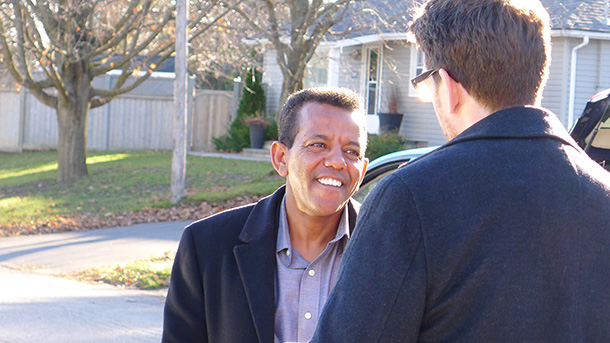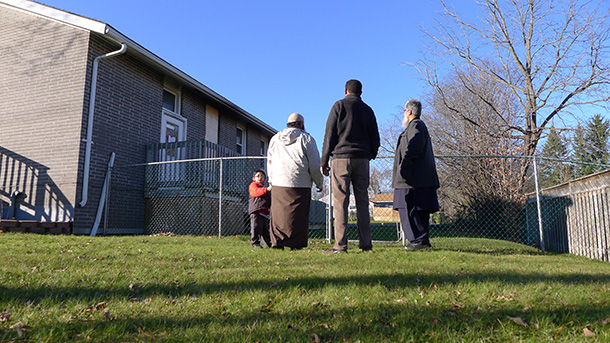The day after an arsonist attacked the Al-Salaam mosque in Peterborough, Ont., Kenzu Abdella stood in front of the smoke-singed building and reflected on the struggle between fear and tolerance engulfing his chosen country.
"I don't remember feeling like this in Canada before. I've been here 30 years," said Abdella, speaking in a calm tone. Thirty metres away, behind a security guard, flowers brought by locals rested on the steps of the building's rear door.
Abdella came from Ethiopia, is a mathematics professor at Trent University, and is president of the Kawartha Muslim Religious Association that operates the only mosque in Peterborough. The fire set there on November 14 was one of a number of violent outbursts against Muslims across Canada last week, after the ISIS terror attacks that murdered 130 in Paris.
"The anti-Muslim rhetoric," Abdella said, lowering his voice, "has played a big role in bringing out the worst in some people."
As well, Abdella and his congregation have received an outpouring of kindness from Peterborough residents. That morning people of all faiths, including some of the city's 1,000 or so Muslims, were there at the mosque to offer their support, some through tears, as TV news crews filmed. Already, more than $100,000 had been raised online to help pay to repair the mosque.
And still, charged rhetoric swirls, with Canada's self-image seemingly at stake.
"ISIS is a threat, no doubt about that. Should we fear it? No. The Canadian population should have full confidence in all the security services to keep us safe." So said Canada's new Defence Minister Harjit Sajjan about ISIS earlier this month.
Wrong, hold onto those fears, was the message issued on Friday by newly appointed Conservative defence critic James Bezan:
"Despite the recent assurances by Defence Minister Harjit Sajjan that Canadians should not fear ISIS, many Canadians are concerned," read Bezan's statement. "Let us never forget that ISIS inspired the terrorist attacks last year here at home in Saint-Jean-sur-Richelieu and Ottawa, claiming the lives of Canadian soldiers, Warrant Officer Patrice Vincent and Cpl. Nathan Cirillo."
In the next paragraph Bezan vaguely spoke of "the new reality" and urged that the Liberal government "not resort to political expediency to implement campaign promises that are no longer relevant." Whether he was talking about just military related campaign promises or also the Liberals' pledge to quickly settle 25,000 Syrian refugees in Canada, Bezan also left vague.
The same day, mayors of 22 of Canada's largest cities left no room for misinterpretation, putting out a statement offering full support to efforts to settle Syrian refugees in Canada, and expressing confidence that the government's efforts to ensure the safety of the public are sufficient.
"We know the federal government takes security issues very seriously and that the screening process for refugees is thorough and rigorous. There is no need to believe that there is a trade-off between compassion and security," read the statement.
Campaign of fear
The struggle over whether to calm, or exploit, some Canadians' uneasiness with Muslim immigrants reached a fever pitch during the recent federal election. Conservatives enlisted the services of Lynton Crosby, an Australian campaign expert with a reputation for fomenting wedge politics to gain votes. They pushed big issues such as climate change and wealth inequality to the sidelines by campaigning to ban Muslim women from wearing niqabs during citizenship ceremonies and while working in the public service.
In citizenship ceremonies, the women's identities are ascertained in a private setting; nevertheless, then immigration minister Chris Alexander suggested the garments -- that cover all but the eyes -- could have terrorists underneath.
Meanwhile, Conservative campaign literature hammered on ISIS vows to kill Canadians in their homes, and the party's response to the heart-wrenching image of a Syrian toddler refugee's body washed up on a Greek beach was to emphasize that accepting Muslim refugees to Canada posed time-consuming security risks. Then the Conservatives proposed to create a hotline allowing citizens to report "barbaric" cultural practices by immigrant neighbours.
Last week the CBC dug into that hotline promise and found it was more a notion than a plan. The RCMP had no knowledge it would be up to them to implement the tip line. Interim Conservative leader Rona Ambrose was asked about that by a reporter. She responded by saying she knew nothing about it at the time, and that "the campaign's over."
After the Peterborough mosque burned, The Tyee asked the Conservative party if it is concerned some of its tactics could lead to rising anti-Muslim sentiment. The party responded by stressing Ambrose had condemned the recent attacks against Muslims.
"Such expressions of intolerance have no place in Canada," Ambrose had said. "In light of the recent atrocities committed in Paris, it is especially important that all Canadians stand united against hatred of all kinds."
Wedge issues and hate crimes
The same night the Peterborough residents were doing their best to let the mosque's members know they are welcome, a Muslim woman in Toronto was beaten and robbed by men yelling anti-Muslim slurs.
Another woman wearing a scarf said a man who mistook it for a hijab also attacked her, and a man in Montreal was arrested and charged for making online threats to kill Muslims.
It is often following such terrorist attacks as Paris that Muslims in western nations feel the brunt of hatred from non-Muslims, said Imran Awan, a criminology lecturer at Birmingham City University in England.
Awan is co-author of the report We Fear for Our Lives: offline and online experiences of anti-Muslim hostility, which examines the effect of anti-Muslim sentiment in the United Kingdom.
Anti-Muslim sentiment has been a growing issue and common news item in the U.K. over the last decade, with many activists and Muslim leaders accusing the nation's politicians and groups such as the English Defence League of stoking it.
According to the Guardian, hate crimes against Muslims in London were up 70 per cent in a one-year period in 2015. Awan said terrorist attacks, such as the one in Paris, act as "trigger events" that set off festering anti-Muslim sentiment often driven by the far right. There's now even an organization called Tell MAMA recording incidents of attacks on Muslims in the country.
Public policy that targets Muslim communities and political rhetoric has led to frequent assaults on Muslim people in the U.K., according to Awan.
"In the U.K. we tend to see after incidents like this quite a big push to bring in policies, counter-extremism strategies and lots of other things that, in effect, law-abiding Muslims who are not doing anything wrong would get put into that pigeonhole," he said.
He said one example in the U.K. is a push to have schoolteachers, doctors and other public servants act as the eyes and ears of the police and report anything they think could be related to terrorism.
'It's like a vacuum for these preachers'
Awan argues such initiatives are actually detrimental to the cause of fighting extremism.
The result is marginalization of the Muslims who feel they are being targeted by society at large, something he said extremist groups want as they try to create public divisions in the West to help them recruit members and sow fear.
In fact, said Awan, radicals cheer on hate crimes against Muslim people.
"To them it means they've got those young impressionable people who are isolated, looking for a sense of identity or belonging," he said. "When they think that their own country doesn't value them it's like a vacuum for these preachers, especially on the Internet, who are able to groom and radicalize and recruit these people."
He said the key to fighting extremism is policy written in a "sensible" way that doesn't single out Muslims, and that excludes initiatives like the Conservatives' barbaric cultural practices tip line and niqab fight.
Awan said fostering dialogue in safe environments and engaging with communities is what will lead Canada down a more peaceful path.
Phil Triadafilopoulos is a professor of political science at the University of Toronto who specializes in immigration policies. He thinks the Conservatives have been taught a lesson by their failed re-election campaign. Even though polls and research showed public support for issues like the niqab ban, it came with a cost.
"Last election was a tough case of whether you can do two things at once -- compete for the votes of new Canadians while scapegoating one segment of new Canadians, and I think the result was negative," he said. "So, the likelihood of [the Conservatives] trying to repeat that experiment... is low."
He said part of the reason is that immigrants to Canada become citizens faster than other nations taking in newcomers and they also vote as much as people born in Canada, so it is politically dangerous to target immigrants.
Bracing for worst
Back in Peterborough, as he stood outside his mosque, Abdella says his congregation must now be prepared to deal with another incident.
"I guess that's a concern," he said. "Of course, we have to be vigilant now; we are already discussing what kind of measures we have to take for the future."

In the meantime he is optimistic Canadians will get the message that Muslims across the country want to live in peace, like any other Canadian.
"We hope that through education, through the media, this anti-Islamic sentiment or Islamophobia will be tackled somehow," he said. "We hope even at the federal level, at the municipal level, all government will play a role."
Shortly after we speak, a white man in a T-shirt and ball cap pulls up in his car, steps out, and walks up to a group of Muslim men talking with Abdella. He tells them he wished he could have been there at the time of the attack to stop it. Abdella embraces the man and thanks him.
Such support, says Abdella, "shows an overwhelming majority of Canadians don't associate with this type of violent act towards their own fellow Canadians. And that makes us feel a lot more comfortable."
But, Abdella points out, people exist who would burn a mosque. Politicians who whip up anti-Muslim sentiment are therefore playing with the fire of hatred fueled by fear. "When it is acted upon," he said, "it can have really bad consequences." ![]()
Read more: Rights + Justice, Federal Politics















Tyee Commenting Guidelines
Comments that violate guidelines risk being deleted, and violations may result in a temporary or permanent user ban. Maintain the spirit of good conversation to stay in the discussion.
*Please note The Tyee is not a forum for spreading misinformation about COVID-19, denying its existence or minimizing its risk to public health.
Do:
Do not: